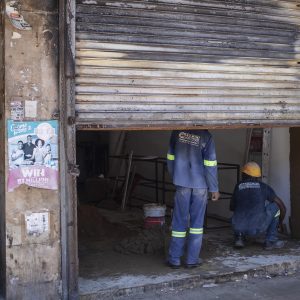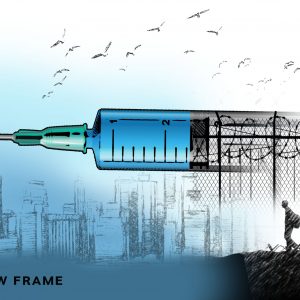Migrant truck drivers remain fearful
Although attacks on migrant drivers and their trucks have subsided, drivers remain in fear of their lives with no concrete solution to the violence and killing in sight.
Author:
10 March 2021

Zodwa Dlamini is a 48-year-old, cross-country driver of a 12-tonne hauler that transports chemicals and other dangerous cargo. She is one of a small but growing number of female trucker drivers on South Africa’s increasingly dangerous highways.
Dlamini, a mother of three adult children, has been driving since obtaining her licence in 1995. After the latest truck-related violence in November, she asked her employers if she could work only in Gauteng.
“I am very scared. I often wonder what will happen to my children if I die or get injured. The work here is very dangerous and any day you could be burnt to ashes during an accident, and on the other you could be burnt with a moving truck by angry protesters,” said the driver who was born in Newcastle and is based in Alberton.
“I once encountered angry protesters, but they let me go because they said I was a local.”
Related podcast:
A study by the Road Freight Association, which represents more than 200 road freight service providers, revealed that it is mostly migrant truck drivers who have been killed since March 2018. Other statistics reveal that more than 1 400 trucks have been torched or looted on South Africa’s roads since 2019.
The latest series of attacks peaked in November, when 84 trucks were burnt in just a few days.
Trucking companies, especially small and independent firms, have been accused of exclusively and “illegally” employing drivers from neighbouring countries such as Zimbabwe, eSwatini and Malawi, paying them low wages and making them work long hours.
Some South African drivers accuse these companies of ignoring the wage and working condition agreements reached between industry employers and unions at the National Bargaining Council for the Road Freight and Logistics Industry.
Violence and wider tensions in the freight industry have been flaring up for a number of years.

Interministerial committee
In response to the violence and killings in November, President Cyril Ramaphosa appointed an interministerial committee led by Minister of Employment and Labour Thulas Nxesi and including the ministries of police, transport and home affairs, the police service, the truck drivers’ union, the trucking industry and the representatives of migrant drivers working in South Africa.
The committee vowed to resolve the outstanding disputes in the trucking industry by January 2021. But a department spokesperson said talks are ongoing. The committee has resolved so far that trucking companies cannot employ migrant drivers who are undocumented or don’t have a work permit.
Violence and attacks have subsided since the November peak. But tensions were still high in February and many migrant drivers are fearful, not knowing when the next wave of attacks will come.
During the height of the violence, the N3 highway between Durban harbour and Gauteng was the route worst affected, with trucks torched and hijacked. The Heidelberg area on the R103 and parts of the N3 highway – such as Mooi River – the R23 and the R505 were also hotspots.

Maskala Johwa, a 35-year-old Zimbabwe-born driver employed by a Mpumalanga-based trucking company, is fearful. He is in the vulnerable group and he knows of five migrant drivers working in South Africa who have been attacked. Two of them died.
Johwa says he prays before moving from one destination to another. “I am scared. I rely on the prayer because we don’t know when these things flare up. One moment it would be peaceful and the next it is hell.”
He was transporting manganese from the Kuruman mines in the Northern Cape to Durban harbour in November for export when a group of armed men stopped him. “They said we are not working today and you cannot go any further because you people are taking our jobs. But fortunately, they didn’t hit us or anything.”
Others didn’t get away as easily. Charles Mabiko, 46, also a Zimbabwe-born driver, said he will never forget the day he nearly died near Upington in the Northern Cape in June last year.

‘Forcing the crowd to split’
Mabiko had delivered crates of beers from the SABMiller depot in Alrode, Johannesburg, to Kuruman. On his way back to Gauteng, he found the road near the Upington township barricaded by burning tyres and other debris, and a group of people chanting anti-migrant songs.
“They threw stones and petrol bombs in my truck. I thought to myself, if I stop here I would be killed. So I had to drive off the road, forcing the crowd to split. Others in the crowd threw stones that broke my side window and hit my face. I also heard gunshots, but I continued driving. Perhaps if I stopped I wouldn’t be here today,” Mabiko said.
He said he had a contract with the truck owner, who had a concession to load for SABMiller.
Related article:
The All Truck Drivers Foundation (ATDF) is an openly xenophobic organisation that has been accused repeatedly of being behind at least some of the violence and attacks on migrant drivers. Members visited the SABMiller offices and threatened management with violence and said they’d disrupt operations if the brewery didn’t stop migrant drivers from working there.
“My contract and that of many other foreign drivers were terminated as a result of this. Now I am unemployed and it is increasingly difficult to get a job in South Africa, because companies say they are afraid of hiring foreign drivers. I am looking for at least cross-border job opportunities so that I can continue to support my family,” said Mabiko.
Regional retaliation
However, cross-border truck driving is not free from trouble. Willfred Bwembya is a 44-year-old Zambian driver who has been hauling goods and minerals since 2004. He has undertaken a number of international driving stints in the past three years and travelled to many countries across the region.
“When we drive through Botswana, Zimbabwe, Zambia, Mozambique and Malawi, we don’t encounter any problems. But when we drive through the Democratic Republic of the Congo and South Africa, we become scared because we don’t know when and where we will come under attack.”

Other migrant drivers said if the violence and mayhem continues in South Africa, those from other nations will retaliate by not allowing South African drivers and trucks into the Southern African Development Community (SADC) region.
The ATDF has denied that it is behind the violence and turmoil in the freight industry. “All we are advocating is for companies to follow the law in South Africa and stop employing foreign drivers under the guise of scarce skills,” said general secretary Sifiso Nyathi.
He said the ATDF has pulled out of talks trying to find solutions to the problems in the trucking industry. “We left the talks because we felt we were being undermined. These talks started in 2018, but it has not produced any results because government officials are scared of the employers, and are scared of telling trucking companies to stop illegally employing foreign drivers instead of South Africans.”
Local fiefdoms
Jean Pierre Misago, a researcher with the African Centre for Migration and Society at the University of the Witwatersrand, said they view the attacks on trucks and migrant drivers as a bigger political project where local strongmen are using the lack of strong policing and the weak central authority to impose their will and create local fiefdoms.
“Making this [the truck violence and attacks] about migration distracts us from what matters,” Misago said.
“South Africa’s unemployment rate is officially over 27%. It is far higher in the places where violence typically occurs. But this violence is not about removing migrants, it is more generally about a dangerous politics of localism and entitlement, and rationing access to rights and opportunities: housing, healthcare, education, business opportunities, labour markets and the like. It is about the emergence of a politics of local strongmen in response to a general breakdown in trust in the rule of law,” he added.
Related article:
Unlike the ATDF, truck drivers’ unions are part of efforts to end tensions and violence in the trucking industry.
Vusi Ntshangase, the general secretary of the Democratised Transport Logistics and Allied Workers’ Union (Detawu), said the union has no issue with the employment of documented migrants who are paid according to the industry standard.
“What we are against is exploitation of undocumented foreign nationals by unscrupulous employers, who pay them less than what is stipulated in the industry main collective agreement, knowing fully well they cannot complain for fear of losing their jobs.”

Gavin Kelly, the chief executive of the Road Freight Association, said there are many untruths being paraded as facts about the freight industry.
He said verified figures from the National Bargaining Council for the Road Freight and Logistics Industry show that out of more than 65 000 employees, fewer than 10 000 are “legally employed” migrants.
“We have stated time and again that the government departments responsible for issuing visas, work permits and the monitoring of employment requirements must perform those functions diligently and efficiently. We would not be here today if those simple functions were properly applied,” Kelly said.
Industry regulation
Department of Employment and Labour spokesperson Musa Zondi said the government is working hard behind the scenes to solve the complex problems in the industry. The security cluster and the South African Police Service have collected information resulting to date in 99 cases being opened and 48 arrests, he said, adding that additional security personnel have been deployed to monitor hotspots.
“The Cabinet also noted the role of unregistered rogue employers in the sector who knowingly employ undocumented foreign nationals, exploiting their vulnerable status in order to underpay them and flouting labour, health and safety legislation and norms. Government is determined to clamp down on these activities, which fan the flames of resentment in the sector,” said Zondi.
Zondi said the government is “finalising a review of national employment policy with a view to setting sectoral quotas for the employment of local and foreign labour.
“The majority of employers in the sector are compliant, and indeed are working with government to tackle these problems. Similarly, there are foreign nationals who are working legally in the sector and have every right to do so.
“Let us remember that South Africa is not an island. We are part of a wider trading network, which reaches into the rest of southern Africa and the wider continent.”
Related article:
Nicholas Ngqabutho Mabhena, the chairperson of the Zimbabwe Community in South Africa and an executive member of the African Diaspora Forum, said they are working with the government and other organisations to find solutions.
After the recent spate of attacks, he said, they investigated the reasons and found that some South African drivers were angry about the low wages paid to migrant drivers.
“From our perspective, the solution lies in both local and migrant drivers working together at the level of forums such as trade unions to solve problems in this industry. This would stop the action of those employers who are exploiting migrant workers. The unions and migrant and local drivers are all realising that the industry has to be regulated so that there would be no more violence and attacks on migrant drivers would stop,” he said.




